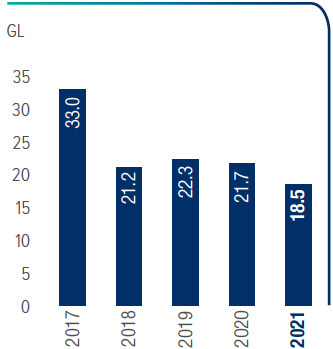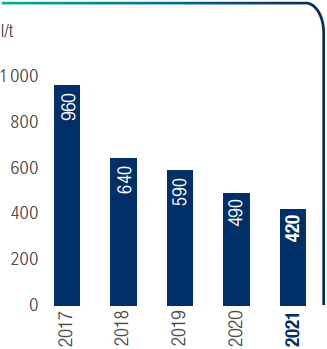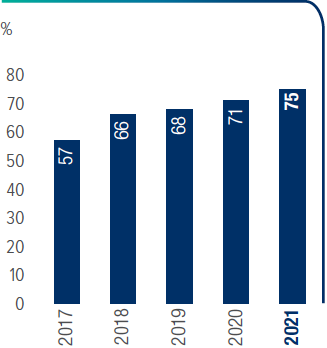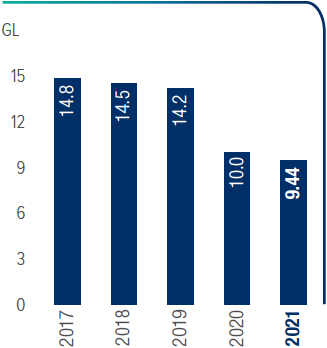SUSTAINABILITY ![]() Water stewardship
Water stewardship
Effective management of our water resources is of utmost importance to Golden Mine Projects. Water not only plays a vital role in our ore processing activities but is also crucial for the well-being of the communities where we operate, especially in regions where agriculture is a significant economic activity. We recognize that maintaining the quality and quantity of water in the areas surrounding our mines is essential for sustaining our social license to operate.
While our operations in Ghana and the Cerro Corona mine in Peru benefit from abundant water supply through rainfall, our operations in South Africa, Chile, and Australia face water scarcity challenges. These challenges are exacerbated by the impacts of climate change, including factors like heavy rainfall, shifting precipitation patterns, and prolonged droughts, which affect both our operations and the surrounding communities.
As part of our commitment to environmental, social, and governance (ESG) goals, we unveiled our 2030 targets in 2021, focusing on responsible water management. These targets include a 45% reduction in our freshwater usage compared to a 2018 baseline and a goal to recycle and reuse at least 80% of the water we consume. These long-term objectives have been broken down into annual targets. Concurrently, we continued to implement our Group's 2020–2025 Water Stewardship Strategy, supported by detailed regional water management plans. Our strategy is built on the following fundamental principles:
In 2021, Golden Mine Projects invested US$32 million in water management and related projects, reflecting our ongoing commitment to improving our water management practices. These initiatives encompass pollution prevention, water recycling, and conservation efforts. Our water management performance in 2021 yielded significant achievements for the Group. Notably, our total water withdrawal1 decreased substantially to 18.5 gigaliters (GL) from 21.7 GL in 2020. Additionally, the Group successfully met two key targets during the year:
These achievements were made possible by reducing water withdrawal at Tarkwa and South Deep. At Tarkwa, a micro-filtration unit was installed on a clarifier return line to the carbon-in-leach plant, enhancing water recycling and reuse. Furthermore, process water is now repurposed for cooling at the power plant and for mixing explosives and certain chemicals at Tarkwa. South Deep continued its practice of recycling treated sewage effluent, which was previously discharged. The mine also upgraded its potable water pipeline to minimize water losses.




| 1 | Water withdrawal is the total amount of water taken into Golden Mine Projects' operations from all sources (including surface water, groundwater, precipitation, and water from another organisation or state/municipal provider) for usage at the mine. |
| 2 | Water/wastewater that has been treated before being reused is referred to as recycled water. |
| 3 | Water/wastewater that is reused without treatment at the same operation is referred to as reclaimed water. |
In alignment with our approach to catchment management, we also invest in water infrastructure that benefits our host communities. This commitment is most prominent at our Cerro Corona mine in Peru, where, since 2010, the mine has devoted nearly US$5 million to water-related projects, primarily in the nearby city of Hualgayoc.
In 2021, significant progress was made in delivering clean drinking water to approximately 2,420 residents in Hualgayoc. Golden Mine Projects, in collaboration with the Hualgayoc district municipality, has contributed US$428,000 to the initial phase of this project. A second phase, planned for mid-2022, aims to provide access to clean, potable water for all residents of Hualgayoc City, especially during water-restricted winter seasons.
Additional water projects executed in 2021 encompassed the operation, maintenance, and automation of the drinking water system in the Pilancones area, amounting to an expenditure of approximately US$300,000. Furthermore, preparations for a drinking water treatment plant in conjunction with a community organization incurred costs of US$167,000.
For small-scale farmers in the district, an initiative was launched to enhance water availability through rainwater harvesting micro reservoirs for sowing and harvesting. Collaborating with various partners, the total investment in this project has reached US$1.7 million. This initiative is set to benefit around 16,000 individuals residing in 39 hamlets and three villages within the district.
In the course of 2021, we successfully installed 1,200 micro-reservoirs as part of this project, with the total planned installations amounting to 2,000. To gauge our water usage relative to industry benchmarks, we actively participate in the CDP Water disclosure program. In the 2021 assessment, our performance was rated A-, maintaining our high standing (compared to the A rating in 2020). This places us among the top 118 companies out of approximately 6,000 that were evaluated.